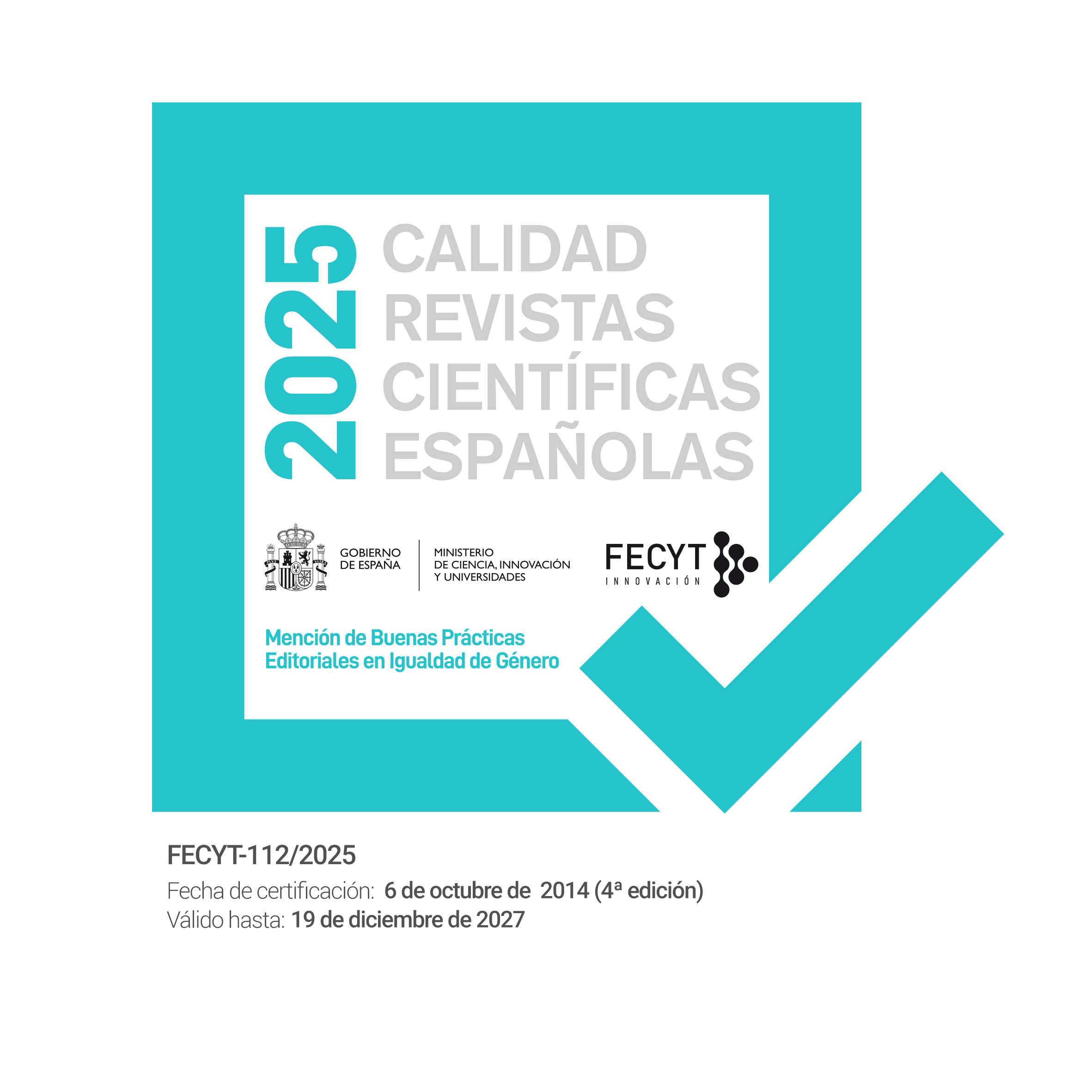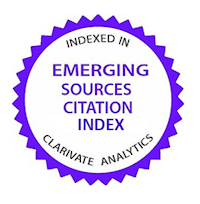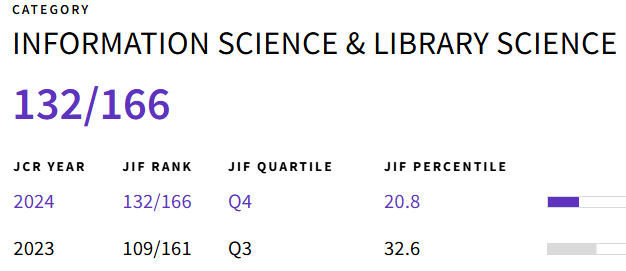Los investigadores junior españoles y su implicación en la ciencia abierta
Resumen
El objetivo es indagar en las actitudes y prácticas de los jóvenes investigadores españoles hacia la ciencia abierta. Se analiza su interés por compartir en abierto publicaciones y datos, por colaborar con otros investigadores y stakeholders, por difundir su investigación y por perseguir el impacto de los resultados científicos.
La metodología se fundamenta en entrevistas y encuestas dirigidas a Early Career Researchers (ECRs) españoles.
Los resultados muestran el interés de los investigadores noveles por la ciencia abierta, pero también la necesidad de reconocimiento de las acciones implicadas en ella como requisito para su consolidación entre investigadores en situación precaria. La financiación es también un factor crítico a considerar.
Descargas
Métricas
-
Resumen729
-
PDF557
Citas
ABDULLAHI, K.A. Data sharing practices of academics in Nigeria: the effects of organizational culture. (Tesis doctoral). Kuala Lumpur: Faculty of computer Science and Information Technology, University of Malaya, 2019.
ABADAL, E. y ANGLADA, L. Ciencia abierta: cómo han evolucionado la denominación y el concepto. Anales de Documentación, 2020, vol. 23, nº 1. Disponible en: http://dx.doi.org/10.6018/analesdoc.378171.
ANGLADA, L. y ABADAL, E. ¿Qué es la ciencia abierta? Anuario ThinkEPI, 2018, vol. 12, p. 292-298. Disponible en: https://doi.org/10.3145/thinkepi.2018.43.
BECHER, T. Academic Tribes and Territories: Intellectual Enquiry and the Cultures of Disciplines. Bristol. Society for Research into Higher Education and Open University Press, 1989.
BLANKSTEIN, M. y WOLFF-EISENBERG, C. Ithaka S+R US Faculty Survey 2018: Report, April 12, 2019. Ithaka S+R. Disponible en: <https://sr.ithaka.org/wp-content/uploads/2019/03/SR-Report-US-Faculty-Survey-2018-04122019.pdf> [Consulta: 28 de enero de 2021]
BORREGO, A. y ANGLADA, L. Faculty information behavior in the electronic environment: Attitudes towards searching, publishing and libraries. New Library World, 2016, vol. 117, nº 3/4, p. 173-185.
CAO, Q.H.; GIYYARPURAM, M.; FARAHBAKHSH, R. y CRESPI, N. Policy-based usage control for a trustworthy data sharing platform in smart cities. Future Generation Computer Systems, 2020, vol. 107, p. 998-1010.
CHATAWAY, J.; PARKS, S. y SMITH, E. How Will Open Science Impact on University-Industry Collaboration? Foresight and STI governance, 2017, vol. 11, nº 2, p. 44-53.
COMISIÓN EUROPEA. Open science monitor. 2017 Disponible en: <https://ec.europa.eu/research/openscience7index.cfm?pg=home§ion=monitor> [Consulta: 2 de enero de 2021]
COMISIÓN EUROPEA. Recomendación (UE) 2018/790 de la Comisión de 25 de abril de 2018 relativa al acceso a la información científica y a su preservación. Diario Oficial de la Comisión Europea, 2018. Disponible en: <https://eur-lex.europa.eu/legal-content/ES/TXT/PDF/?uri=CELEX:32018H0790&from=ES> [Consulta: 8 de enero de 2021]
COMISIÓN EUROPEA. Progress on Open Science: towards a shared research knowledge system: final report of the Open Science Policy Platform. Luxembourg: Publications Office of the European Union, 2020.
CRAGIN, M.H.; PALMER, C.L.; CARLSON, J.R. y WITT, M. Data sharing, small science and institutional repositories. Philosophical Transactions of the Royal Society of London A. mathematical, Physical and Engineering Sciences, 2010, vol. 368, nº 1926, p. 4023-4038. Disponible en: https://doi.org/10.1098/rsta.2010.0165.
DALTON, E.D.; TENOPIR, C. y BJÖEK, B-C. Attitudes of North American academics toward open access scholarly journals. Portal: Libraries and the academy, 2020, vol. 20, nº 1, p. 73-100. Disponible en: <https://preprint.press.jhu.edu/portal/sites/ajm/files/20.1dalton.pdf> [Consulta: 27 de enero de 2021]
DIGITAL SCIENCE. The state of open data 2020: the longest-running longitudinal survey and analysis on open data. London: Digital Science, 2020. Disponible en: <https://www.digital-science.com/resources/portfolio-reports/the-state-of-open-data-2020/> [Consulta: 15 de enero de 2021]
FOSTER. The future of science is open. 2018. Disponible en: <https://www.fosteropenscience.eu/> [Consulta: 23 de enero de 2021]
FRITZ, L. y BINDER, C. Participation as relational space: A critical approach to analyzing participation in sustainability research. Sustainability, 2018, vol. 10, nº 8, p. 2853. Disponible en: https://doi.org/10.3390/su10082853.
FU, D.Y. y HUGHEY, J.J. Releasing a preprint is associated with more attention and citations for the peer-reviewed article. eLife, 2019, vol. 8, e52646. Disponible en: <https://elifesciences.org/articles/52646> [Consulta: 28 de enero de 2021]
HERMAN, E. y NICHOLAS, D. Scholarly reputation building in the digital age: An activity-specific approach. Review article. El profesional de la información, 2019, vol. 28, nº 1, e280102. Disponible en: https://doi.org/10.3145/epi.2019.ene.02.
JAMALI, H.R.; NICHOLAS, D. y HERMAN, E. Scholarly reputation in the digital age and the role of emerging platforms and mechanisms. Research Evaluation, 2015, vol. 24, p. 1-13. Disponible en: doi: 10.1093/reseval/rvv032.
KIM, Y. Data sharing from the perspective of faculty in Korea. Libri, 2017, vol. 67, nº 3, p. 179-192.
KIM, Y. y NAH, S. Internet researchers’ data sharing behaviors: an integration of data reuse experience, attitudinal beliefs, social norms, and resource factors. Online information review, 2018, vol. 42, nº 1, p. 124-142.
LEVIN, N. y LEONELLI, S. How Does One “Open” science? Questions of Value in Biological Research. Science, Technology, & Human Values, 2017, vol. 42, nº 2, p. 280-305. Disponible en: https://doi.org/10.1177%2F0162243916672071.
LEVIN, N.; LEONELLI, S.; WECKOWSKA, D.; CASTLE, D. y DUPRÉ, J. How do scientists define openness? Exploring the relationship between open science policies and research practice. Bulletin of science, Technology & Society, 2016, vol. 36, nº 2, p. 128-141. Disponible en: https://doi.org/10.1177%2F0270467616668760.
LUTHE, T. Success in transdisciplinary sustainability research. Sustainability, 2017, vol. 9, nº 71. Disponible en: https://doi.org/10.3390/su9010071.
MARCIAL, L.H. y HEMMINGER, B.M. Scientific data repositories on the Web: an initial survey. Journal of the American Society for information Science and Technology, 2010, vol. 61, nº 10, p. 2029-2048. Disponible en: https://doi.org/10.1002/asi.21339.
MCGUIRE, A.L.; HAMILTON, J.A.; LUNSTROTH, R.; MCCULLOUGH, L.B. y GOLDMAN, A. DNA data sharing. Research participants’ perspectives. Genetics in Medicine, 2008, vol. 10, nº 1, p. 46. Disponible en: <https://www.nature.com/articles/gim20087> [Consulta: 23 de enero de 2021]
NICHOLAS, D. et al. Open science from the standpoint of the new wave of researchers: Views from the scholarly frontline. Information Services & Use, 2019b, vol. 39, nº 4, p. 369 -374. Disponible en: https://doi.org/10.3233/ISU-190069.
NICHOLAS, D. et al. New ways of building, showcasing, and measuring scholarly reputation. Learned Publishing, 2015, vol. 28, nº 3, p. 169-183. Disponible en: https://doi.org/10.1087/20150303.
NICHOLAS, D. et al. A global questionnaire survey of the scholarly communication attitudes and behaviours of early career researchers. Learned Publishing, 2020b, vol. 33, nº 3, p. 198-211. Disponible en: https://doi.org/10.1002/leap.
NICHOLAS, D. et al. How is open access publishing going down with early career researchers? An international, multi-disciplinary study. El profesional de la información, 2020c, vol. 29, nº 6, e290614. Disponible en: https://doi.org/10.3145/epi.2020.nov.14.
NICHOLAS, D. et al. Early career researchers and their publishing and authorship practices. Learned Publishing, 2017b, vol. 30, nº 3, p. 205-2017. Disponible en: https://doi.org/10.1002/leap.1102.
NICHOLAS, D. et al. Does the scholarly communication system satisfy the beliefs and aspirations of new researchers? Summarizing the Harbingers research. Learned Publishing, 2020a, vol. 33, nº 2, p. 132-141. Disponible en: https://doi.org/10.1002/leap.1284.
NICHOLAS, D. et al. So, are early career researchers the harbingers of change? Learned Publishing, 2019a, vol. 32, nº 3, p. 237-247. Disponible en: https://doi.org/10.1002/leap.1232.
NICHOLAS, D. et al. Early career researchers: Scholarly behaviour and the prospect of change. Learned Publishing, 2017a, vol. 30, nº 2, p. 157-166. Disponible en: https://doi.org/10.1002/leap.1098.
NOSEK, B.A. et al. Promoting an open research culture. Science, 2015, vol. 348, nº 6242, p. 1422-1425. Disponible en: https://doi.org/10.1126/science.aab2374.
O’HANLON, R.; MCSWEENEY, J. y STABLER, S. Publishing habits and perceptions of open access publishing and public access amongst clinical and research fellows. Journal of the Medical Library Association, 2020, vol. 108, nº 1, p. 47-58. Disponible en: https://doi.org/ 10.5195/jmla.2020.751.
PARK, J. y GABBARD, J.L. Factors that affect scientists’ knowledge sharing behavior in health and life sciences research communities: differences between explicit and implicit knowledge. Computers in Human Behavior, 2018, vol. 78, p. 326-335. Disponible en: <https://dl.acm.org/doi/abs/10.1016/j.chb.2017.09.017> [Consulta: 4 de enero de 2021]
PIWOWAR, H.A. y CHAPMAN, W.W. Public sharing of research datasets: a pilot study of associations. Journal of informetrics, 2010, vol. 4, nº 2, p. 148-156. Disponible en: <https://www.ncbi.nlm.nih.gov/pmc/articles/PMC3039489/> [Consulta: 28 de enero de 2021]
PIWOWAR, H. et al. The state of OA: a large-scale analysis of the prevalence and impact of Open Access articles. PeerJ, 2018, b6: e4375. Disponible en: https://doi.org/10.7717/peerj.4375.
ROBERTS, E.; ANDERSON, B.A.; SKERRATT, S. y FARRINGTON, J. A review of the rural-digital policy agenda from a community resilience perspective. Journal of Rural Studies, 2017, vol. 54, p. 372-385. Disponible en: https://doi.org/10.1016/j.jrurstud.2016.03.001.
RODRÍGUEZ-BRAVO, B. y NICHOLAS, D. Reputación y comunicación científica: investigadores españoles en el inicio de su carrera. El profesional de la información, 2019, vol. 28, nº 2, e280203. Disponible en: https://doi.org//10.3145/epi.2019.mar.03.
RODRÍGUEZ-BRAVO, B. y NICHOLAS, D. Descubrir, leer, publicar, compartir y monitorizar el progreso: comportamiento de los investigadores junior españoles. El profesional de la información, 2020a, vol. 29, nº 5, e290503. Disponible en: https://doi.org/10.3145/epi.2020.sep.03.
RODRÍGUEZ-BRAVO, B. y NICHOLAS, D. Coautoría y revisión por pares: prácticas y percepciones de los investigadores noveles españoles. Revista General de Información y Documentación, 2020b, vol. 30, nº 2, p. 379-399. Disponible en: http://dx.doi.org/10.5209/rgid.72817.
RUIZ-PÉREZ, S. y DELGADO-LÓPEZ-CÓZAR, E. Spanish researchers’ opinions, attitudes and practices towards open access publishing. El profesional de la información, 2017, vol. 26, nº 4, p. 722-734. Disponible en: https://doi.org/10.3145/epi.2017.jul.16.
SCHMIDT, L. y PRÖPPER, M. Transdisciplinarity as a real-world challenge: a case study on a north-south collaboration. Sustainability Science, 2017, vol. 12, p. 365-379. Disponible en: <https://link.springer.com/article/10.1007/s11625-017-0430-8> [Consulta: 28 de enero de 2021]
SEGADO-BOJ, F.; MARTÍN-QUEVEDO, J. y PRIETO-GUTIÉRREZ, J.-J. Attitudes toward open Access, open peer review, and altmetrics among contributors to Spanish scholarly journals. Journal of scholarly publishing, 2018, vol. 50, nº 1, p. 48-70. Disponible en: doi: 10.3138/jsp.50.1.08.
SEVERIN, A.; EGGER, M.; EVE, M.-P. y HÜRLIMANN, D. Discipline-specific open access publishing practices and barriers to change: an evidence-based review. F1000research, 2018, vol. 7, nº 1925. Disponible en: <https://f1000research.com/articles/7-1925> [Consulta: 26 de enero de 2021]
TAKASJIMA, K. et al. Ethical concerns on sharing genomic data including patients’ family members. BMC medical ethics, 2018, vol. 19, nº 61. Disponible en: <https://bmcmedethics.biomedcentral.com/articles/10.1186/s12910-018-0310-5> [Consulta: 12 de enero de 2021]
TENOPIR, C. et al. Data sharing by scientists: practices and perceptions. PloS One, 2011, vol. 6, nº 6, e21101. Disponible en: https://doi.org/10.1371/journal.pone.0021101.
TOELCH, U. y OSTWALD, D. Digital open-science-Teaching digital tools for reproducible and transparent research. PloS Biology, 2018, vol. 16, nº 7, e2006022. Disponible en: doi: 10.1371/journal.pbio.2006022.
VAN DEN EYNDEN, V. y CORTI, L. Advancing research data publishing practices for the social sciences: from archive activity to empowering researchers. International Journal on Digital libraries, 2017, vol. 18, nº 2, p. 113-121. Disponible en: <https://link.springer.com/article/10.1007/s00799-016-0177-3> [Consulta: 11 de enero de 2021]
VICENTE-SAEZ, R. y MARTÍNEZ-FUENTES, C. Open Science now: A systematic literature review for an integrated definition. Journal of Business Research, 2018, vol. 88, p. 428-436. Disponible en: https://doi.org/10.1016/j.jbusres.2017.12.043.
WEBER, N.M.; PIWOWAR, H.A. y VISION, T.J. Evaluating data citation and sharing policies in the environmental sciences. Proceedings of the American Society for information Science and Technology, 2010, vol. 47, nº 1, p. 1-2. Disponible en: https://doi.org/10.1002/meet.14504701445.
WOUTERS, P. Policies on digital research data: an international survey. Amsterdam: Niwi-Knaw, 2002.
XU, J. et al. Chinese researchers‘ perceptions and use of open access journals. Results of an online questionnaire survey. Learned publishing, 2020, vol. 33, nº 3, p. 246-258. Disponible en: https://doi.org/10.1002/leap.1291.
ZENK-MÖLTGEN, W.G; AKDENIZ, E.; KATSANIDOU, A.; NABHOVEN, V. y BALABAN, E. Factors influencing the data sharing behavior of researchers in sociology and political science. Journal of Documentation, 2018, vol. 74, nº 5, p. 1053-1073. Disponible en: doi:10.1108/JD-09-2017-0126.

Esta obra está bajo una licencia internacional Creative Commons Atribución 4.0.
Las obras que se publican en esta revista están sujetas a los siguientes términos:
1. El Servicio de Publicaciones de la Universidad de Murcia (Editum) conserva los derechos patrimoniales ('copyright') de las obras publicadas, y favorece y permite la reutilización de las mismas bajo la licencia de uso.
2. Las obras se publican en la edición electrónica de la revista bajo la licencia Creative Commons Atribución Internacional CC BY 4.0. Se puede copiar y redistribuir el material en cualquier medio o formato y remezclar, transformar y crear a partir del material para cualquier finalidad, incluso comercial.







